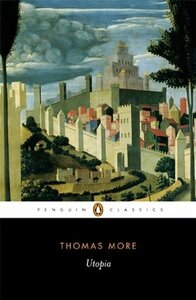You need to sign in or sign up before continuing.
Take a photo of a barcode or cover
informative
slow-paced
Plot or Character Driven:
N/A
Strong character development:
N/A
Loveable characters:
N/A
Diverse cast of characters:
N/A
Flaws of characters a main focus:
N/A
Thomas More is one of the figures of history of whom has interested me deeply. In reading his Utopia, I initially thought the book would lessen my interest in him, it being a bore, though it triumphed over my initial expectation. I say such, but really it neither enhanced nor damaged my previous interest in the man. Utopia is split into two books, the first being a discussion with Raphael, a traveller that More “interviews” whilst on business in Brussel’s about the flaws of the contextual Tudor English society under King Henry VIII at the time, exploring issues such as enclosing and the system of capital punishment. The second book then listed out the policies of the ‘Utopian’s’, a group of people who are presented by Raphael to live in the perfect society, hence coining the philosophical term of a ‘Utopia’. It explores the Utopians systems of currency (or interestingly lack of), religion, farming, military and justice system. Utopia is technically categorised as fiction, though I felt, with its philosophical focus, it read much more like a non-fiction book. It also often alludes and bases its ideas off of the works of Plato and Aristotle, and I feel as if I could’ve gained a lot more from More’s work having read Plato’s “The Republic” beforehand. However, to a modern reader the title of Utopia is deceiving. Whilst in the context of the time the society of the Utopians would be the idealistic societal system, it also incorporates the same societal norms of patriarchal gender systems, therefore not the Utopian society we would imagine today. Additionally, there is emphasis on having a lack of personal life, working for the good of the society and devoting all time to it, and laws against leaving the island without government permission. This led me to make connections to the later genre of the dystopia, the system of control looking more like the one in place in Orwell’s “1984”. Further, the Utopian’s employ many societal ideas that formed the basis of the communist manifesto, an ideology which appears Utopian and the basis of perfect society, however due to the nature of corruption in mankind has frequently been proven by history to fail. Ultimately, Utopia is philosophically very interesting in concept, though More’s ideas, or rather Raphael’s as asides by the author indicate his disapproval with some policies, are flawed in many areas. Further, in some areas it slightly drags and though interesting, isn’t the most engaging at all times.
informative
reflective
slow-paced
hopeful
informative
inspiring
reflective
slow-paced
Plot or Character Driven:
N/A
Strong character development:
Complicated
Loveable characters:
Complicated
Diverse cast of characters:
No
Flaws of characters a main focus:
Complicated
This book was fully brought to my attention when I watched 'Ever After' with Drew Barrymore, and she quotes this book as well as seen reading this book. As I read this, I felt like watching that movie one more time with the number of references that movie has.
So, what did I expect from this one? I was thinking it would be more like Beowulf but about a perfect place. I did not expect the level of philosophy in it and did not see the writing style to feel like a was reading a book that should be under Biography.
I was also stumped by how much this can relate to today more than 500 years later. I think this and a few other classics should be reread often to be better in this world and to do better to the people in it.
Now to rewatch 'Ever After'.
So, what did I expect from this one? I was thinking it would be more like Beowulf but about a perfect place. I did not expect the level of philosophy in it and did not see the writing style to feel like a was reading a book that should be under Biography.
I was also stumped by how much this can relate to today more than 500 years later. I think this and a few other classics should be reread often to be better in this world and to do better to the people in it.
Now to rewatch 'Ever After'.
adventurous
hopeful
informative
inspiring
slow-paced
Plot or Character Driven:
Character
Strong character development:
Complicated
Loveable characters:
Yes
Diverse cast of characters:
No
Flaws of characters a main focus:
No
informative
reflective
slow-paced
Plot or Character Driven:
N/A
Strong character development:
N/A
Loveable characters:
No
Diverse cast of characters:
No
Flaws of characters a main focus:
N/A
adventurous
challenging
lighthearted
relaxing
slow-paced
Plot or Character Driven:
Plot
Strong character development:
No
Loveable characters:
No
Diverse cast of characters:
No
Flaws of characters a main focus:
No
An incredibly detailed and visual political commentary on the state of Europe in the early-modern period. The formatting of different sections and the halves dedicated to European and Utopian society, politics, and culture were fantastic. Overall, a brilliant piece of work that stands the test of time.
challenging
reflective
slow-paced
Plot or Character Driven:
Plot
Strong character development:
No
Loveable characters:
Complicated
Diverse cast of characters:
No
Flaws of characters a main focus:
No
Çoğu yerde o kadar güncel ki bu kitaptan önce Ütopya’nın kavram olarak olmadığı bu kitapla birlikte 500 küsür yıl önce ortaya atılmış olması gerçeğini aklım almakta zorlandı. Edebiyata bir yazın türü olarak ütopyayı kazandırmış olmasıyla birlikte favori kurgu kategorilerimden olan distopyanın oluşumuna yolu açmış olması sebebiyle de gönlümü çeldi.
Bununla birlikte, Hristiyanlık güzellemesi Ütopya’da kendi yarattığı dinlere eşit mesafede durma ilkesiyle çelişiyor. Aynı zamanda metinde Ütopyalıların daha iyi ve daha kapsayıcı bir inanışa kolaylıkla sıcak bakabildiklerini de söylüyor denebilir; fakat orda da çelişkiyi yok etmeye çalışmış ama olmamış. Anlatıcının kendi ağzından kendi inanışı olan Hristiyanlığa bariz bir kıyak geçmesi Ütopya’nın objektifliği bozmuş.
Bununla birlikte, Hristiyanlık güzellemesi Ütopya’da kendi yarattığı dinlere eşit mesafede durma ilkesiyle çelişiyor. Aynı zamanda metinde Ütopyalıların daha iyi ve daha kapsayıcı bir inanışa kolaylıkla sıcak bakabildiklerini de söylüyor denebilir; fakat orda da çelişkiyi yok etmeye çalışmış ama olmamış. Anlatıcının kendi ağzından kendi inanışı olan Hristiyanlığa bariz bir kıyak geçmesi Ütopya’nın objektifliği bozmuş.
Bir yandan Ahlak ve Erdem üzerine düşüncelerinde Sokrates’in ağırlığını görüyoruz; ki hatta More’un da Erdem takıntısından bahsedebiliriz bence. Bu ve bağlantılı kavramları ele alışı yer yer demode denebilecekken bir diğer yandan ölüm cezasına karşı çıkma nedenleriyle çağının ne kadar ilerisinde olduğunu görebiliyoruz. Monarşi yanlısıyken aynı zamanda sınıfsız bir toplumu hayal etmesi gibi. İlk defa bir yazara renk atamak istedim; Sanırım benim için Thomas More bu zıtlıkları bir arada bulundurmasıyla bir renk olsa gri olurdu. Klişenin söylediği “Hayat siyah ya da beyaz değildir; grilerden oluşur”daki gri gibi.
A short book in size, but infinite in the depth of it’s concepts, Utopia gives you a lot to sink in. A truly philosophical work. An intemporal masterpiece. And surely one of the books of my life. The descriptions of this platonic island of Utopia, both physically and conceptually different from all other 16th century’s European Nations, marks a vivid discussion of what was fair or not in society at that time. I simply cannot put to words the craft, the depth, with which Thomas More was enlightened to create this magnificent work. I vividly recommend you read it.
challenging
informative
slow-paced
adventurous
informative
mysterious
reflective
fast-paced




